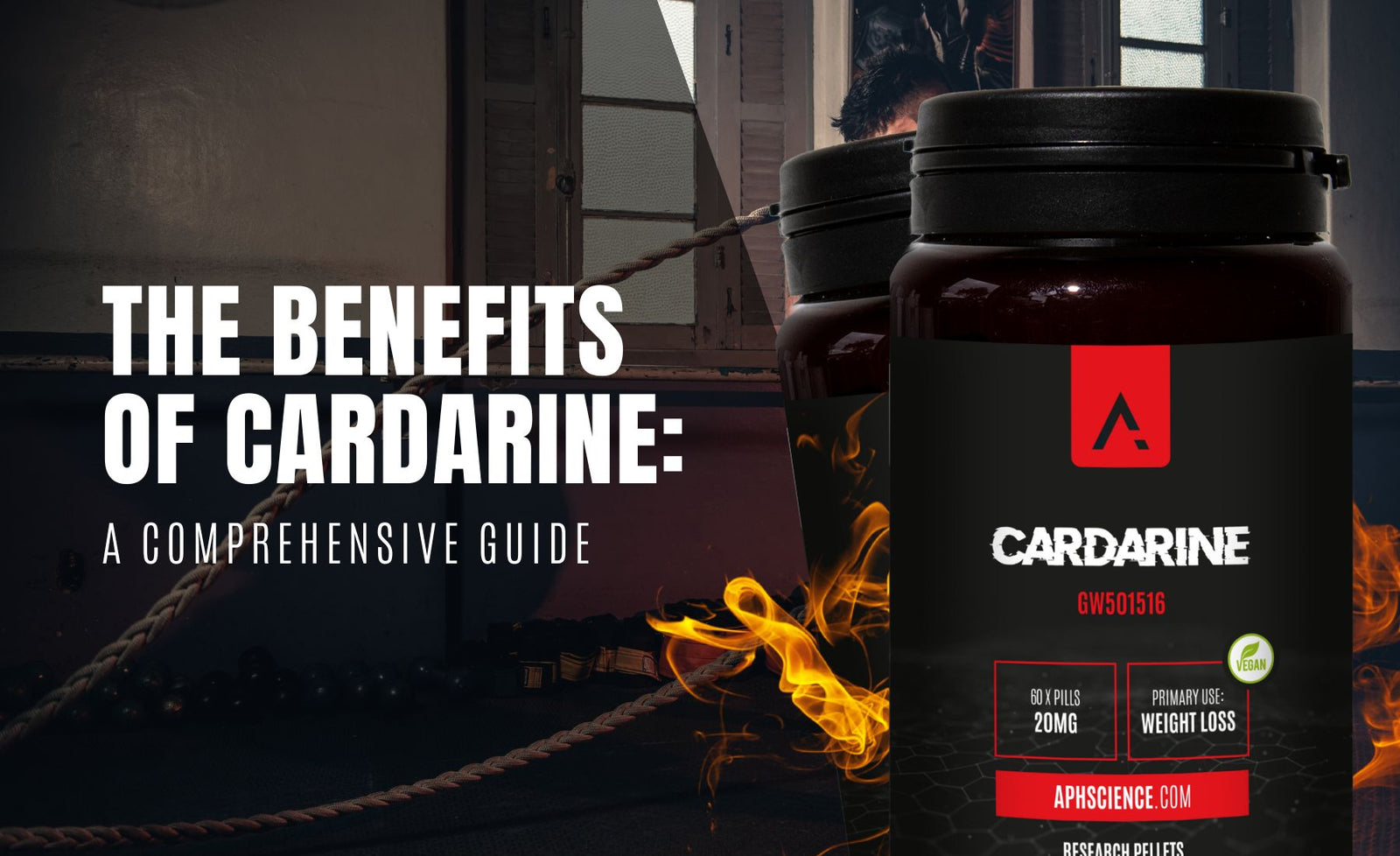The Benefits of Cardarine: A Comprehensive Guide
Cardarine, also known as GW-501516, is a popular compound in the world of fitness and bodybuilding. Its ability to enhance endurance, burn fat, and improve overall health has made it a sought-after supplement for athletes and enthusiasts alike. In this comprehensive guide, we will explore the many benefits of Cardarine, its safety profile, dosage recommendations, and legal status.
Understanding Cardarine
What is Cardarine?
Cardarine is a selective androgen receptor modulator (SARM). Unlike anabolic steroids, Cardarine works by activating the peroxisome proliferator-activated receptor-delta (PPAR-delta) pathway in the body.
Cardarine has gained popularity among athletes and bodybuilders due to its potential performance-enhancing effects. It is known for its ability to increase endurance, improve fat loss, and potentially provide other health benefits.
When taken orally, Cardarine binds to the PPAR-delta receptors in the body, which are found in various tissues, including skeletal muscle and adipose tissue. By activating these receptors, Cardarine stimulates the expression of genes involved in energy expenditure and fat metabolism.
Many individuals use Cardarine as a supplement to support their fitness goals. It is important to note that Cardarine is not approved for human use by regulatory authorities and is primarily used for research purposes.
The Science Behind Cardarine
Research has shown that Cardarine increases the expression of genes involved in energy expenditure and fat metabolism. This leads to improved endurance, enhanced fat loss, and potentially many other health benefits.
Studies conducted on animal models have demonstrated the positive effects of Cardarine on endurance. In one study, mice treated with Cardarine were able to run longer distances compared to the control group. This suggests that Cardarine may enhance aerobic capacity and improve overall performance.
Furthermore, Cardarine has been found to promote fat loss by increasing the oxidation of fatty acids. This means that it helps the body utilize stored fat as a source of energy, leading to a reduction in body fat percentage.
In addition to its effects on endurance and fat loss, Cardarine has also shown potential benefits for cardiovascular health. Research has indicated that Cardarine may improve lipid profiles by increasing high-density lipoprotein (HDL) cholesterol levels and reducing triglycerides.
While the research on Cardarine is promising, it is important to note that most studies have been conducted on animal models, and more research is needed to fully understand its effects and potential risks in humans.
It is crucial to consult with a healthcare professional before considering the use of Cardarine or any other performance-enhancing supplement. They can provide personalized advice and help you make informed decisions regarding your fitness and health goals.
The Health Benefits of Cardarine
Cardarine, also known as GW501516, is a popular compound among athletes and fitness enthusiasts due to its numerous health benefits. This article will delve into the various advantages of Cardarine and how it can positively impact your overall well-being.
Cardarine and Heart Health
One of the most notable benefits of Cardarine is its positive impact on heart health. Studies have shown that it can increase HDL (good) cholesterol levels and decrease LDL (bad) cholesterol levels, leading to a healthier cardiovascular system. By promoting a favorable cholesterol profile, Cardarine helps reduce the risk of heart disease and other related conditions.
Furthermore, Cardarine has been found to have anti-inflammatory properties, which can further contribute to heart health. Chronic inflammation is a known risk factor for cardiovascular diseases, and by reducing inflammation, Cardarine helps maintain a healthy heart.
Cardarine's Role in Fat Loss
Cardarine has gained attention for its ability to enhance fat burning and aid in weight loss. It works by activating the PPAR-delta pathway, which increases the body's ability to utilize stored fat as a source of energy. This can be particularly beneficial during periods of calorie restriction or when trying to achieve a lean physique.
In addition to its fat-burning properties, Cardarine has also been shown to improve insulin sensitivity. By enhancing insulin sensitivity, Cardarine helps regulate blood sugar levels and prevents the accumulation of excess body fat. This makes it an excellent supplement for individuals looking to improve their body composition and overall metabolic health.
Enhancing Endurance with Cardarine
Athletes often turn to Cardarine for its ability to improve endurance and stamina. It does this by increasing the number of mitochondria in muscle cells, thereby enhancing the body's capacity to produce energy aerobically. With improved aerobic capacity, athletes can perform at higher intensities for longer durations, leading to enhanced athletic performance.
Moreover, Cardarine has been found to reduce oxidative stress and inflammation in muscle tissues. By minimizing muscle damage and promoting faster recovery, Cardarine allows athletes to train harder and more frequently, ultimately leading to improved performance and results.
In conclusion, Cardarine offers a range of health benefits, including improved heart health, enhanced fat loss, and increased endurance. However, it's important to note that Cardarine is a research chemical and not approved for human consumption. As with any supplement, it's crucial to consult with a healthcare professional before considering its use.
Safety and Side Effects of Cardarine
Cardarine, also known as GW501516, is a popular compound that has gained attention for its potential benefits in various studies. However, it is important to approach its safety and side effects with caution, as most of the research conducted so far has been on animals. Long-term human studies are still limited, and the potential risks associated with Cardarine, if any, are not completely understood.
Potential Risks of Cardarine
When considering the safety of Cardarine, it is crucial to acknowledge the limitations of the current research. While animal studies have shown promising results, extrapolating these findings to human use requires further investigation.
One of the primary concerns raised about Cardarine is its potential to cause cancer. However, it is important to note that the link between Cardarine and cancer is primarily based on studies conducted on rodents at extremely high doses. These doses may not accurately reflect the levels used in human consumption, making it difficult to draw definitive conclusions about the compound's carcinogenic effects on humans.
Furthermore, it is worth mentioning that the metabolism and physiological responses to substances can vary significantly between species. Therefore, caution should be exercised when interpreting animal studies and applying their findings to human use.
Addressing Common Concerns
Despite the concerns surrounding Cardarine and its potential risks, it is essential to address some of the common concerns raised by individuals.
One common concern is the potential impact of Cardarine on liver health. While some studies have suggested a possible association between Cardarine and liver damage, it is important to note that these studies were conducted on animals and used high doses of the compound. Human studies are needed to determine the effects of Cardarine on liver function accurately.
Another concern is the impact of Cardarine on hormonal balance. Some individuals worry that Cardarine may disrupt hormone levels, leading to adverse effects. However, current research on Cardarine's effect on hormones is limited, and more studies are required to understand its impact on hormonal balance in humans.
Additionally, it is important to note that individual responses to Cardarine may vary. Factors such as dosage, duration of use, and overall health can influence the potential side effects experienced by individuals. Therefore, it is recommended to consult with a healthcare professional before starting Cardarine or any other supplement.
In conclusion, while Cardarine shows promise in various studies, it is crucial to approach its safety and potential side effects with caution. The limited long-term human studies and the reliance on animal research make it challenging to fully understand the risks associated with Cardarine. As with any supplement, it is advisable to consult with a healthcare professional before use to ensure its appropriateness for individual circumstances.
Dosage and Usage of Cardarine
Determining the Right Dosage
Dosage recommendations for Cardarine are still being investigated. However, most users tend to take between 10-20mg per day for a period of 8-12 weeks. It is advisable to start with a lower dosage and monitor your body's response before gradually increasing it.
When determining the right dosage for Cardarine, it is important to consider various factors such as your body weight, fitness goals, and overall health condition. Consulting with a healthcare professional or a qualified fitness expert can provide valuable guidance in this regard. They can assess your individual needs and help you establish an appropriate dosage that aligns with your specific requirements.
Conclusion
Just 30-40 minutes after use, Cardarine gets to work removing fatty acids and selectively burning fat. But it's not just about losing weight - this powerful supplement also increases muscle efficiency by an impressive 150%, helping you get the most out of every workout.
Plus, Cardarine does more than just enhance your physical fitness. It also reduces bad cholesterol, contributing to improved heart health. Users have reported losing up to 15kg, making this a potent tool in your fitness arsenal.
Ready to experience the benefits of Cardarine for yourself? Click the link below to get your hands on top-quality Cardarine from APH Science.










